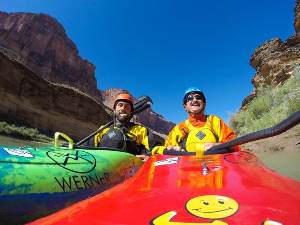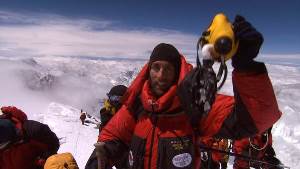Erik Weihenmayer: Harnessing Adversity As a Blind Adventurer

“A person who is severely impaired never knows his hidden sources of strength until he is treated like a normal human being and encouraged to shape his own life.” –Helen Keller, Teacher, 1955
Erik Weihenmayer, the only blind person to climb the Seven Summits, achieved another historical first last September: solo kayaking the Grand Canyon. Alongside blind Navy veteran and kayaker Lonnie Bedwell, the two adventurers were able to navigate the 277-miles of the Colorado River with the help of their team. After years of training, they were able to triumph through the rough waters and overcome adversity.
But where did Erik’s strength and determination to overcome his blindness come from? Now as an accomplished adventurer, author, and motivational speaker, Erik took some time to reflect with APH CareerConnect.
“I went blind at 13, and I was kind of stubborn. I guess I had a rebellious mind. I didn’t really want to be blind. That’s probably a repeating story for a lot of people who go blind,” Erik explained.
“I wanted to ignore it,” Erik said. “I wanted to pretend I wasn’t blind. I would walk down the hallway at school and feel people looking down at me. That feeling of alienation is probably universal to all adolescences, but to me it was bigger.”
As with many young adults, Erik had trouble accepting his vision loss. He refused to take advantage of the tools of blindness. In his mind, if he learned to read braille or use a white cane, he would be letting his vision loss win. He would allow this overwhelming obstacle to define who he was as a person.
Stumbling through the hallways and struggling emotionally, Erik explained how his refusal to acknowledge his disability affected him and how difficult it was to be a blind teenager in school.
He would be sitting by himself during lunch listening to his friends a few tables over having fun, full of joy and laugher, while he sat alone. Just like everyone else, he didn’t want to be swept to the sidelines and forgotten because of his blindness.
After this realization, Erik decided to embrace his journey of vision loss and make the most out of life. He began to take advantage of the tools of blindness by learning braille, using a white cane, and adapting to new technologies.
“Those tools are a fundamental part of your success,” Erik said. “I wish I learned those tools earlier, but I think you have to go through a process. A lot of the things I’ve done, like kayaking the Grand Canyon or climbing Everest, it’s the same thing. It’s a process. You have to go through the process, and you have to start with this overwhelming goal in mind.”
“It feels overwhelming when trying to break through those barriers”, Erik explained. “But when you get stuck at moments and have trouble overcoming the situation, you have to figure out how to harness those adversities and ride that storm through to the next level.”
“I guess that’s called a breakthrough. The journey of blindness is like that too. I think you have to go through stages. And then you respond to those adversities and realize that this is my life and I’m going to max it out and push the parameters,” Erik said.
One of the most significant experiences that impacted Erik’s journey of blindness was joining the wrestling team. Having the courage to step outside of your comfort zone and learn a new sport as someone who is blind or visually impaired can be intimidating, but Erik was eager to find where he could fit in.
Erik explained how the freshman would all stand in a line during try-outs and face the state champion wrestler. The state champ would pick them off one by one. He would grab each of the freshmen and completely destroy them, Erik recalled. He would slam them down to the mat and pin them like it was nothing, but when it was Erik’s turn to face the champion, everyone was unsure what would happen.
“He grabbed me, and he slammed my face into the mat just like every other freshman in the line, and I loved it,” Erik said. “It was the greatest thing he could have ever done because he didn’t treat me special. He slammed me into the mat like everyone else. And we became best friends over the years.”
“I became part of the team,” Erik explained. “I felt part of the tribe, and I knew I could be part of that group. I think all human beings, we all want to be a part of something bigger, and blind people you have to search hard for what that’s going to be. You can’t play ball sports as well, you’re left out. So, there’s a higher chance that you’re never part of that bigger tribe and you never feel that belonging.”
“So I would say to parents, you have to make sure, even if your kid isn’t athletic, it doesn’t matter, get them into something and make them part of something. Whether it’s a technology or engineering club or a chess club or whatever their interest may be in,” Erik said.
“The second thing is get them trying everything,” Erik continued. “I made kind of an unconscious decision after going blind that I was going to try everything, everything that got thrown in front of me. I’m glad I did because rock climbing was the ticket for me.”

By getting involved in different sports and groups, Erik was able to overcome the difficulties brought on by his vision loss. He did not let it stop him from trying new things and accomplishing his goals.
Although there are many techniques Erik has used to adapt to different situations such as rock climbing and kayaking, there are still struggles in his life as a result of his vision loss.
“There are some things as a dad I regret,” Erik said. “I can’t go out and toss a baseball with my son, so there are very obvious struggles as a blind parent. But that just means you just have to search harder for the ways that you’re going to engage with your children so that those things aren’t a hole.”
“We just find things we can do as a family together,” Erik explained. “We do a lot of hiking and family adventuring. We go on raft trips sometimes together. I think it’s more about the time where you are bonding together.”
Even with obvious struggles, Erik doesn’t let anything stop him. He continues to achieve success in his personal life and career as an author, motivational speaker, and adventurer.
“My career is going well in terms of speaking and writing, but I want to write another book. I’m also going to be working on a film of the Grand Canyon from the footage we captured, so career wise, it’s a never ending list of goals and trying to finish those stories,” Erik said.
Being employed as someone who is blind or visually impaired helps you be a part of something bigger, Erik explained. “There’s a feeling in our society when you are employed, you have a purpose.”
Full of life and experience, Erik Weihenmayer is certainly someone to look up to and admire. He has overcome unbelievable obstacles and left his mark on the world without letting his vision loss ever stop him.
“There are not that many blind people compared to sighted people, so if you’re blind, you are kind of an ambassador,” Erik said. “People are sort of judging you and trying to decide what you can do and just judging our whole community based on one person. There’s lots of pressure, but that’s the way it is.”
“Like I wrote in my book, when I was trying to get my first job, people were judging me. I thought I would be a dishwasher because I got shut down for one reason after the next. I did not know what reality was because I never washed dishes at a restaurant, so I didn’t know whether I could do it. How could I know, nobody gave me a chance. That’s a hard lesson when you are blind. No matter how good you are, there are people that are going to shut you down and put that wall in front of you. It is so much about connecting with the right people and finding people that are believers.”
For more information about Erik and his adventures, visit http://touchthetop.com/.